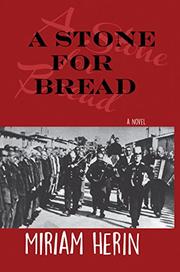


A Stone for Bread
by Miriam Herin
A graduate student uncovers the truth behind a scandal that ended a university teacher’s career.
In this new novel from Herin (Absolution, 2007), enterprising graduate student Rachel Singer decides in 1997 to talk to disgraced North Carolina poet and former Duke University professor Henry Beam. She’s intent on learning what really happened 34 years earlier, when Beam published a group of poems that he claimed were written by a prisoner in the Nazi concentration camp Mauthausen in Austria. Critics jumped on the book, A Stone for Bread, accusing Beam of inventing the whole collection and effectively driving him into seclusion. With little coaxing from Rachel, Beam begins telling his story, recounted in skillfully handled jump-cuts between past and present. He tells her about the year he spent in Paris, the love affair he had with a woman named Eugénie, and the intellectual alliance he made with a passionate French political agitator named Renard Marcotte. And gradually, he tells her about the man named René, the source of the Stone for Bread poems (and the focal point of his own point-of-view thread running throughout the book). Over the course of their interviews, Beam drops his guard around Rachel, and she in turn personalizes her interest, although she’s slow to abandon her caution about what she’s hearing (“He was a writer after all. Could she trust anything he told her?”). Herin’s carefully constructed narrative steadily builds in tension as its separate storylines accelerate and pull together; the reader learns more about the surprisingly heady time Beam spent in France with Eugénie and the pitched back and forth of his encounters with Renard. At one point, Beam tells Rachel: “Passion is that way in us, one-third God, two-thirds devil.” As Beam’s feelings for Rachel deepen, clues begin accumulating about a mystery in Rachel’s own past. In this last thread, there might be a touch too much contrivance for some readers, but the compelling book’s dramatic structure is carried with such eloquence and earnestness that its author can pull off the occasional plot convenience. The series of climactic revelations is expertly done.
A man long accused of fabricating a book of Holocaust poems reveals deeper and more complicated secrets in this absorbing novel.